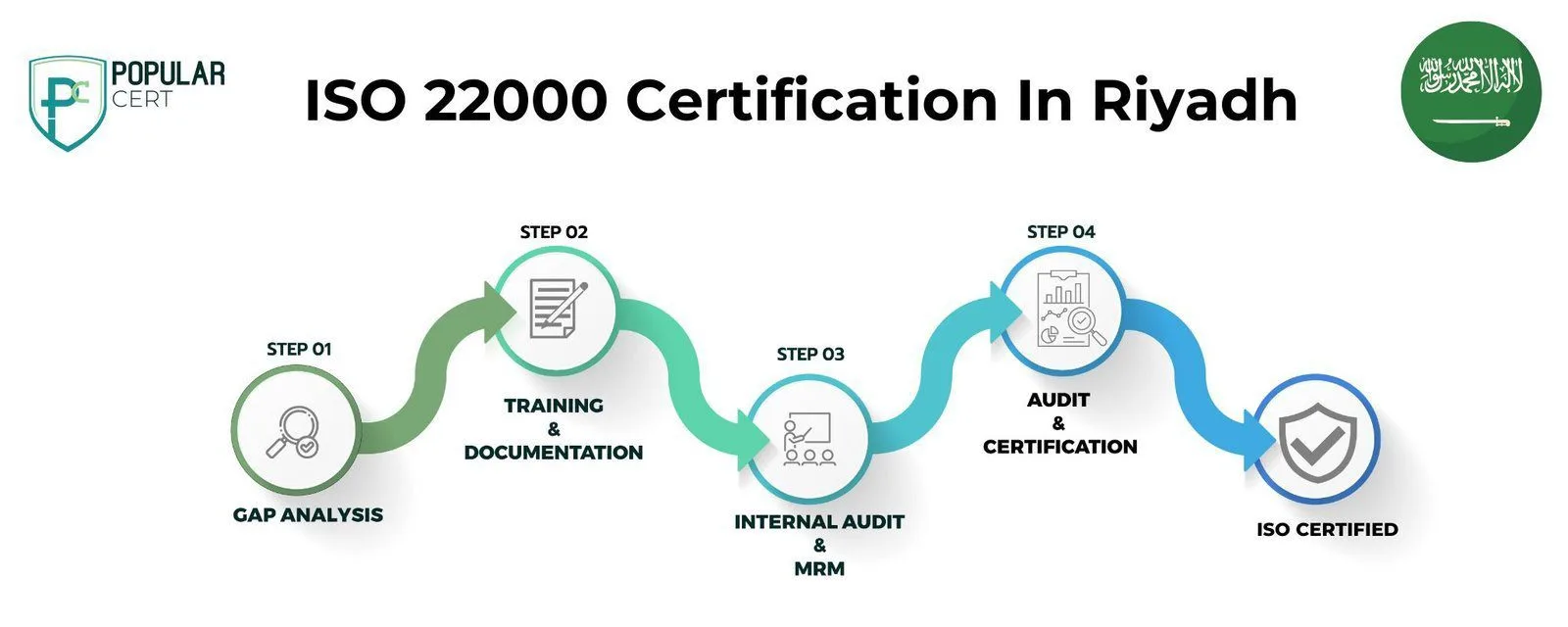ISO 22000 Certification In Riyadh
Get Free Consultation
ISO 22000 certification In Riyadh ensures that your organization meets international standards for food safety management. This certification focuses on establishing, implementing, and maintaining a robust food safety management system (FSMS). It helps organizations identify and control food safety hazards, ensuring the production of safe food at all stages of the supply chain. Achieving ISO 22000 Certification demonstrates a commitment to customer satisfaction, regulatory compliance, and continuous improvement in food safety practices.
PopularCert provides expert ISO 22000 consultation and certification services in Riyadh, helping organizations implement effective food safety management systems (FSMS). With a deep understanding of local and international food safety standards, PopularCert offers tailored solutions to meet the specific needs of each business. Our services focus on enhancing food safety, mitigating risks and improving operational efficiency, leading to improved customer trust and satisfaction.
Why do you need ISO 22000 Certification in Riyadh?
ISO 22000 Certification is essential for organizations in Riyadh to ensure food safety and build trust with customers and stakeholders. It establishes a robust Food Safety Management System (FSMS), enabling businesses to identify, prevent and control food safety hazards across the supply chain. Riyadh’s dynamic food industry requires compliance with international standards, making ISO 22000 crucial for meeting regulatory requirements and customer expectations.
How to Get ISO 22000 Certification In Riyadh?

Process to Get ISO 22000 Certification In Riyadh
Consultation and Gap Analysis
Organizations start by assessing their current food safety management system against ISO 22000 requirements. This gap analysis identifies areas needing improvement or adjustment.
Planning, Documentation, and Policy Development
After identifying gaps, the organization develops necessary documentation, including a comprehensive food safety management system manual, procedures, and records aligned with ISO 22000 requirements.
Training and Awareness
The documented system is put into practice. All employees are trained on the new procedures and protocols to ensure the system's effectiveness.
Internal Audit and Management Review
Conducting internal audits helps identify non-conformities or areas for improvement, allowing the organization to address them proactively. Top management assesses the overall performance of the food safety management system to ensure alignment with the organization’s strategic goals.
External Certification Audit and Certification
We collaborate with accredited certification bodies to facilitate the external audit process for ISO 22000. Upon successful completion of the audit, we assist in securing the ISO 22000 certification. Additionally, PopularCert provides ongoing support by coordinating surveillance audits and offering expert guidance to ensure continuous compliance and improvement in food safety management systems.
Benefits of ISO 22000 Certification in Riyadh
- Enhanced Food Safety : ISO 22000 enables organizations to develop robust food safety systems, reducing the risk of food-related illnesses and ensuring safer food products.
- Compliance with Regulatory Requirements : ISO 22000 certification demonstrates adherence to international food safety standards, facilitating business operations and minimizing legal issues.
-
Improved Consumer Confidence : ISO 22000 certification assures consumers of the safety of the food, fostering trust in the brand and enhancing customer satisfaction.
-
Operational Efficiency : Implementing ISO 22000 improves food safety, reduces waste, and optimizes resource use, enhancing overall business efficiency and cutting costs.
-
Access to New Markets : ISO 22000 certification allows businesses to enter new markets more easily, particularly in regions with stringent food safety regulations.
-
Competitive Advantage : ISO 22000 certification provides a market edge and improves opportunities in tender processes, showcasing the company's commitment to food safety and quality.
Types Of ISO Certification In Riyadh
Get Free Consultation
Our Clients


















Why Choose PopularCert For ISO 22000 Certification in Riyadh?
PopularCert is a globally trusted consulting firm specializing in certification, advisory, and auditing services. For ISO 22000 certification in Riyadh, businesses rely on us as their top choice. Our experienced and ethical consultants work closely with your organization, offering a smooth, tailored certification process to ensure compliance with food safety management standards and drive long-term success. For more information and to apply for ISO 22000 certification in Riyadh.
Cost of ISO 22000 Certification in Riyadh
The cost of ISO 22000 certification in Riyadh varies based on factors like organization size, complexity, and readiness. It typically includes consulting, training, documentation, audit, and certification fees. PopularCert offers tailored, affordable solutions to meet your specific needs, ensuring a seamless and efficient certification process while adhering to international standards.
GET A FREE CONSULTATION NOW
FAQ
What is ISO 22000 certification, and why is it important for businesses in Riyadh?
ISO 22000 is an international standard that specifies requirements for a food safety management system (FSMS). It enables organizations involved in the food chain to ensure food safety hazards are controlled to ensure that food is safe at the time of human consumption. In Riyadh, obtaining ISO 22000 certification demonstrates a company’s commitment to food safety, enhances customer confidence, and can open up new market opportunities.
Which organizations in Riyadh are eligible for ISO 22000 certification?
Any organization involved in any aspect of the food chain, regardless of size or complexity, can pursue ISO 22000 certification. This includes food manufacturers, processors, distributors, retailers, and even organizations providing related services such as cleaning and transportation.
How long does it take to achieve ISO 22000 certification in Riyadh?
The time frame for obtaining ISO 22000 certification can vary depending on the organization’s size, complexity, and readiness. Generally, it can take anywhere from a few months to a year to complete the entire process, from initial assessment to receiving the certification.
